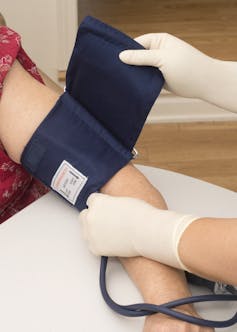If you’re an adult and live in Australia, you’re more likely to be overweight or obese than not: 63% and 37% respectively.
This excess weight is associated with increased premature death and disease, and places a significant cost burden on the national health system. The direct and indirect cost to the Australian economy associated with obesity is currently estimated to be A$58 billion annually.
New research I’m presenting this week at the Primary Health Research Conference shows that if GPs ask their patients to weigh in at each visit, the obesity pendulum could start swinging the other way.
The problem
There’s a widespread tendency to refer to this obesity crisis as an “epidemic”. This is problematic because it encourages a victim mentality, and implies helplessness.
The causes of this phenomenon are complex: the overabundance of cheap, energy-dense foods, a major reduction in work-related energy expenditure, screen time and “junk food” advertising are all part of the problem.
What has been overlooked in this debate is the complicit role of the medical fraternity. In the 1980s, the health sector was criticised for obsessing about weight and so focused more on healthy eating and exercise. It became politically incorrect to talk directly about, or even address the fact of obesity.
Several studies examining GP attitudes to dealing with obesity reflect their doubt about whether they can help their patients lose weight. Some GPs have the view that weight is the patient’s responsibility. Others say weight management is not their professional domain, or that they’re time-poor or poorly trained. Others still are overwhelmed by the size of the problem.
Even patients who struggle with their weight are reluctant to talk to their GP. Their reasons include stigma, a sense of failure to self care and a belief of being seen as “stupid and fat”.
What is worse is that this burden of disease is disproportionally shouldered by those who are at the lower end of the health, wealth, education divide, or are Indigenous.
Possible solutions
The interesting thing is that, except in rare cases, most people get to a level where they stop putting on weight; they maintain their weight. So weight maintenance might be a better mental goal than weight loss per se.
There are hundreds of medical studies looking into different approaches to tackling the problem. They have mixed, and mostly poor outcomes.
The most successful have required dedicated teaching and ongoing engagement of patients in weight-loss programs. These are costly and can only be delivered to a minority of the target population. In reality, there is a paucity of studies delivering evidence of effective, population-wide interventions.
Like other lifestyle-induced diseases, we have been there before. The Smoking, Nutrition, Alcohol and Physical Activity (SNAP) intervention, modelled by GPs, has taken years to reap rewards – but it has. Along with other public health initiatives, it has resulted in Australia having the lowest rate of smoking in the western world.
This hope formed the basis of a small pilot study I conducted last year with the Illawarra and Southern General Practice Research Network. The study involved five GP practices simply weighing consenting adult patients (recruited over one month) at each presentation and giving normal advice if needed.

The logic was that, just as patients know GPs take blood pressure seriously because they measure it frequently, if patients were weighed at each presentation they might also recognise that it is a health issue of importance. This provided an element of accountability, at least encouraging weight maintenance rather than continued gain.
Over a twelve-month period, the 198 patients in the study each lost an average of 0.8 kilograms, which isn’t particularly significant. But a sub-group of obese patients showed a significant average weight loss of 2.5kg.
We know that the average Australian adult gains 0.416 kg a year, so staying weight-neutral is a significant accomplishment – and the cost is minimal. Weight measurement should join other biometric health measurements in GP consultations.
One other tool that might better equip GPs in their role is to gain some expertise in motivational interviewing. This technique involves collaboration versus confrontation; evocation (drawing out) versus imposing ideas; automnomy versus authority.
In essence, expressing empathy, supporting self-efficacy, rolling with resistance and developing discord may win more hearts and minds than traditional approaches to this problem.

